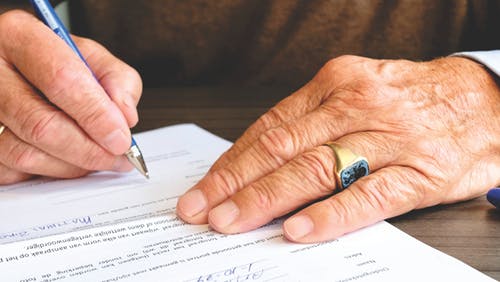What Are The Types of Power of Attorney?
Posted by on Apr 3, 2020 in Blog, Wills & Estate
Have you ever thought about creating a power of attorney?
A power of attorney is a document in which one person appoints someone else to act on his or her behalf. This individual is known as the “donor” while the appointed person is known as the “attorney”.
Many individuals choose to create a power of attorney as they approach old age so that the appointed individual can manage his or her property. Others may implement a power of attorney to handle financial affairs if they are travelling.
While having one is a good way to protect your finances, the type of power of attorney you implement is important.
There are four types of power of attorney, each with their own specific purposes.
What is a Power of Attorney?
In order to create a power of attorney, the donor must be an adult capable of making his or her own decisions at the time the power of attorney is signed.
The attorney does not need to be a lawyer. They do, however, have to be a capable adult and should be someone that the donor trusts completely.
He or she has complete authority to deal with the financial and legal affairs of the donor – to what degree depends on the limitations and restrictions specified in the power of attorney document.
The attorney is responsible for acting in the best interest of the donor. They are also expected to avoid situations where there is a conflict of interest as well as keep your property and money separate from their own.
A power of attorney should not be confused with either a Last Will and Testament or a Living Will. The power of attorney is invalidated when the donor dies. A power of attorney cannot be used to handle property and finances after the donor dies.
The Types of Power of Attorney
General Power of Attorney
When a power of attorney is considered “general”, this means that the attorney can perform almost any act that the donor can perform. This includes opening financial accounts and managing personal finances.
A person may choose to create a general power of attorney in order to give money managers the authority to buy and sell investments on behalf of the donor.
This arrangement is automatically terminated when the donor becomes mentally incapacitated or passes away.
Durable Power of Attorney
A durable power of attorney is an arrangement that allows the attorney to act on the donor’s behalf just as the general power of attorney.
The difference here is that the durable power of attorney maintains the power of attorney even after the donor becomes mentally incapacitated.
This type of power of attorney is often used when individuals wish to have one trusted person deal with their finances and other responsibilities should they become mentally incapable of doing so.
Special or Limited Power of Attorney
Special or limited power of attorney grants the attorney specific powers related to certain areas of the donor’s life. For example, the attorney may be given the authority to sell the donor’s property if they are not available to do so.
Because special power of attorney is limited to what is specified in the signed document, it is important that the donor is abundantly clear about what power they wish to bestow upon the attorney.
Donors can also create more than one special power of attorney to assign different responsibilities to different individuals.
Springing Durable Power of Attorney
In some areas, a springing durable power of attorney is available. It becomes effective when a specific event occurs in the donor’s life, such as becoming mentally incapacitated.
For example, someone in the military may implement a springing durable power of attorney in case they are deployed overseas or in case they are disabled during their service. This way, an attorney is automatically appointed and can take care of the individual’s financial affairs.
Having a spring durable power of attorney prevents confusion and conflict involving an individual’s property and finances.
How Important Is It to Have a Power of Attorney?
You may believe that having a will to sort out your assets after your death is a sufficient way to protect your finances and property.
However, have you ever considered what would happen to your assets if you no longer had the capacity to make decisions about these things?
Without a power of attorney, your family cannot access your assets. Unless your accounts are in joint names with your spouse, the banks have every right to freeze your accounts until an alternative form of authority is given.
Without a power of attorney, should you become mentally incapacitated, your spouse or family member will have to initiate proceedings and applications to gain statutory guardianship over your assets and finances. This can be a long and expensive process.
Without a power of attorney, the family member applying for guardianship may not be the individual you would choose to handle your affairs.
By signing a power of attorney, you are protecting yourself should anything happen to you in the future. You are ensuring that your affairs are handled exactly the way you want them to be handled.
Choosing the type of power of attorney appropriate to your situation, and filling out the necessary paperwork, can be confusing and frustrating.
To make sure the process is taken care of thoroughly and properly, contact our experienced lawyers at Heritage Law for more information.





